|
|
|
Sort Order |
|
|
|
Items / Page
|
|
|
|
|
|
|
| Srl | Item |
| 1 |
ID:
075658
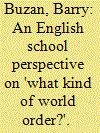

|
|
|
| 2 |
ID:
131416
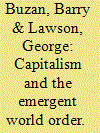

|
|
|
|
|
| Publication |
2014.
|
| Summary/Abstract |
The two-centuries-old hegemony of the West is coming to an end. The 'revolutions of modernity' that fuelled the rise of the West are now accessible to all states. As a consequence, the power gap that developed during the nineteenth century and which served as the foundation for a core-periphery international order is closing. The result is a shift from a world of 'centred globalism' to one of 'decentred globalism'. At the same time, as power is becoming more diffuse, the degree of ideological difference among the leading powers is shrinking. Indeed, because all Great Powers in the contemporary world are in some form capitalist, the ideological bandwidth of the emerging international order is narrower than it has been for a century. The question is whether this relative ideological homogeneity will generate geo-economic or geopolitical competition among the four main modes of capitalist governance: liberal democratic, social democratic, competitive authoritarian and state bureaucratic. This article assesses the strengths and weaknesses of these four modes of capitalist governance, and probes the main contours of inter-capitalist competition. Will the political differences between democratic and authoritarian capitalists override their shared interests or be mediated by them? Will there be conflicting capitalisms as there were in the early part of the twentieth century? Or will the contemporary world see the development of some kind of concert of capitalist powers? A world of politically differentiated capitalisms is likely to be with us for some time. As such, a central task facing policy-makers is to ensure that geo-economic competition takes place without generating geopolitical conflict.
|
|
|
|
|
|
|
|
|
|
|
|
|
|
|
|
| 3 |
ID:
030363
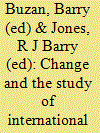

|
|
|
|
|
| Publication |
London, Frances Pinter (Publishers), 1981.
|
| Description |
xii, 241p.
|
| Standard Number |
0903804832
|
|
|
|
|
|
|
|
|
|
|
|
Copies: C:1/I:0,R:0,Q:0
Circulation
| Accession# | Call# | Current Location | Status | Policy | Location |
| 019888 | 327.072/BUZ 019888 | Main | On Shelf | General | |
|
|
|
|
| 4 |
ID:
173462
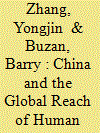

|
|
|
|
|
| Summary/Abstract |
This article examines the complex dialogical relationship between China and the global reach of human rights. It charts the transformation of China from a human rights exception and a human rights pariah state to an active participant in, and shaper of, global human rights governance. It looks at such transformation as dynamic social and political processes full of contradictions and the negotiated outcome of China's communicative engagement with “moral globalization” in a world morally divided on the meaning of human rights. It contends that the global reach of human rights understood as advancing rather than perfecting global justice will always remain contentious, as it is contingent on the possibility of open public reasoning across cultures and national boundaries in a global moral conversation. It also argues that China has resourcefully used the idiom of human rights for two specific purposes. One is to justify and rationalize its “developmental relativism” as an excuse for practices that condone continued political repression in China; the other is to internalize politics of contestation within the institutions of global human rights governance by shifting the centre of gravity of both the normative debate and the practical application of human rights.
|
|
|
|
|
|
|
|
|
|
|
|
|
|
|
|
| 5 |
ID:
122949
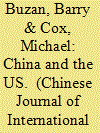

|
|
|
|
|
| Publication |
2013.
|
| Summary/Abstract |
Competing great powers, and the potential for clashes among them when there are changes of place at the top of the hierarchy, are an old story in international relations. Against this realist model of inevitably warlike power struggles stands another idea: 'peaceful rise'. China committed itself to this policy a decade ago, and arguably adopted it as far back as the shift to reform and opening up in the late 1970s. The only other modern great power than can possibly claim to have risen peacefully is the United States. Since there are only two cases of attempted peaceful rise, it is worth asking what parallels can be drawn between the United States and Chinese experiences. Given their different placements in history, with the rise of the United States having taken place between 1865 and 1945, a century earlier than China's current rise, what lessons, if any, can be learned for China from the United States experience? This article looks closely at both the meaning of 'peaceful rise' and the credibility of the United States and Chinese claims to it. It surveys the key points of similarity and difference between the United States and China during their process of rise, comparing contemporary China with the United States of the late 19th and early 20th centuries, not with today's United States. The conclusion sets out six lessons for China and for international society that can be drawn from comparing the two cases.
|
|
|
|
|
|
|
|
|
|
|
|
|
|
|
|
| 6 |
ID:
094970
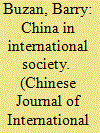

|
|
|
|
|
| Publication |
2010.
|
| Summary/Abstract |
This article reviews China's position in international society over the past couple of centuries, and against that background assesses the prospects for China's strategy of 'peaceful rise'. I stick to the label 'peaceful rise' because it is a more accurate statement of the issues than the more anodyne and diplomatic 'peaceful development' which has recently replaced it in official Chinese discourse.1 I understand 'peaceful rise' to mean that a growing power is able to make both absolute and relative gains in both its material and its status positions, in relation to the other powers in the international system, and to do so without precipitating major hostilities between itself and either its neighbours or other major powers. Peaceful rise involves a two-way process in which the rising power accommodates itself to rules and structures of international society, while at the same time other powers accommodate some changes in those rules and structures by way of adjusting to the new disposition of power and status. I am not going to question whether China will rise or not, though this is done by some.2 Instead, I take China's continued rise as given, and explore whether its peaceful rise is possible within contemporary international society.
|
|
|
|
|
|
|
|
|
|
|
|
|
|
|
|
| 7 |
ID:
175844
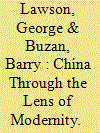

|
|
|
|
|
| Summary/Abstract |
This article examines China’s encounter with modernity from the 19th century to the present day. It builds on the historical narrative of modernity developed by Buzan and Lawson (2015), and two theoretical perspectives: uneven and combined development, and differentiation theory. The article opens with a short history of modernity, establishing that it is not a static phenomenon, but a continuously unfolding process. It then explores five periods of China’s encounter with modernity: imperial decline and resistance to modernization; civil war and Japanese invasion; Mao’s radical communist project; Deng’s market socialism; and Xi’s attempt to synthesize Confucius, Mao, and Deng. It explores both how China fits into the general trajectory of modernity, and how it has evolved from rejection of it to constructing its own distinctive version of ‘modernity with Chinese characteristics’. The article ends by reflecting on what issues remain within China’s version of modernity, and how it fits, and doesn’t fit with other forms of modernity already established within global international society.
|
|
|
|
|
|
|
|
|
|
|
|
|
|
|
|
| 8 |
ID:
161575
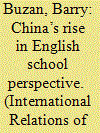

|
|
|
|
|
| Summary/Abstract |
This chapter looks at English School (ES) theory as a way of understanding China and its rise. It focuses both on where ES theory fits well enough with China to provide an interesting perspective, and on where ‘Chinese characteristics’ put China outside the standard ES framing and raise theoretical challenges to it. The first section briefly reviews the ES literature on China. The second section places China within the normative structure of contemporary global international society by looking at how China relates to the primary institutions that define that society. The third section explores two challenges that ‘Chinese characteristics’ pose for how the ES thinks about international society: hierarchy and ‘face’. The Conclusions assess the strengths and weaknesses of ES theory in relation to understanding the rise of China.
|
|
|
|
|
|
|
|
|
|
|
|
|
|
|
|
| 9 |
ID:
095108
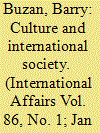

|
|
|
|
|
| Publication |
2010.
|
| Summary/Abstract |
This article investigates a hypothesis drawn from Martin Wight, that a society of states lacking a shared culture, as a result of expansion beyond its original base, will be unstable. This instability hypothesis has been influential in how the English School has presented the history of the expansion of European international society to a global scale. The article starts by offering two models of how a global international society could have come about since the late classical era: a multicultural encounter among several expanding civilizations (polycentric), or the takeover of the system by one centre (monocentric). Using these models as a backdrop, two accounts of the expansion story are developed. The Vanguardist account emphasizes the exceptionalism of European culture, posits a 500-year period of western domination, sees multiculturalism and the decline of western power as problematic, and tends to pessimism about the future of international society. The Syncretist account emphasizes the permanence of cross-cultural exchange, posits only a 200-year period of western dominance, sees culture and international society as evolving together, and is not pessimistic about the stability of international society. These two models and two accounts are then used to assess the possible future of international society. The article argues that culture is less of a problem for international society than Wight, and much of the English School, suppose. The evidence for the substantial success of syncretism is strong and provides considerable stability to most of the likely outcomes. The key problem is not culture, but socio-political structure. How can what North et al. call natural states and open access orders find shared practices and institutions that do not destabilize international society?
|
|
|
|
|
|
|
|
|
|
|
|
|
|
|
|
| 10 |
ID:
051226
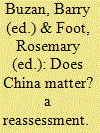

|
|
|
|
|
| Publication |
London, Routledge, 2004.
|
| Description |
xiv, 193p.: ill.pbk
|
| Standard Number |
0415304121
|
|
|
|
|
|
|
|
|
|
|
|
Copies: C:1/I:0,R:0,Q:0
Circulation
| Accession# | Call# | Current Location | Status | Policy | Location |
| 048146 | 951.05/BUZ 048146 | Main | On Shelf | General | |
|
|
|
|
| 11 |
ID:
082928
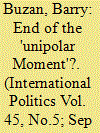

|
|
|
|
|
| Publication |
2008.
|
| Summary/Abstract |
This paper argues that while the US might retain the desire, and up to a point the material capacity to lead, it is likely to find itself increasingly without followers. Partly this is because the US is less accepted as a model, partly it is because of differences on specific policies, and partly it is because of the changing foundations of legitimacy in international society. The big issues likely to dominate the international agenda in the coming years are more likely to decrease than to increase the willingness of others to follow the US. The waning of US leadership is not just a consequence of the particular incompetence of the Bush administration over the last 8 years, though that has surely amplified the problem. It reflects deeper changes that make global hegemony by any single power, or even by the West collectively, decreasingly legitimate.
|
|
|
|
|
|
|
|
|
|
|
|
|
|
|
|
| 12 |
ID:
131992
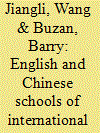

|
|
|
|
|
| Publication |
2014.
|
| Summary/Abstract |
This article compares the academic histories of the so-called 'Chinese School' and the English School in the six dimensions of origin, founders, and organization; naming; context; aims/intentions; theory sources; and historical projects. The English School is mature enough to present fairly clear contents for each section, but as the Chinese School is much newer and still hotly contested as a concept, many things about it are uncertain and controversial; it lacks a single defining concept or frame. The opportunity at hand, therefore, is to apply the experience of the English School to the formative process of a Chinese School or schools, at the same time making clear the considerable differences that time, place and circumstance make to the two projects. The article concludes by looking at possible lessons for the development of International Relations (IR) theory in China, both from what the English School has accomplished and for which it has been criticized. Along the way we provide a bibliographical introduction to both projects.
|
|
|
|
|
|
|
|
|
|
|
|
|
|
|
|
| 13 |
ID:
138069
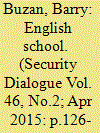

|
|
|
|
|
| Summary/Abstract |
The terms ‘English School’ (ES) and ‘international security’ seldom appear in the same sentence. Yet the ES can and should constitute a general approach to International Security Studies (ISS) comparable to realism, liberalism, constructivism and several other approaches to International relations (IR). The article begins by sketching out how the ES’s idea of raison de système provides a general framing for ISS that counterpoints approaches focused on raison d’état. It then shows how the ES’s societal approach provides specific insights that could strengthen analysis of international security: by providing a normative framing for securitization; by showing the historical variability of key ISS concepts such as war, balance of power and human rights; by adding an inside/outside dimension to security relations based on differentiations within international society; and by complementing regional approaches to international security with its societal approach. The article aims to initiate a conversation between the ES and ISS by showing where the fruitful links are, and by introducing the relevant ES literature to ISS scholars.
|
|
|
|
|
|
|
|
|
|
|
|
|
|
|
|
| 14 |
ID:
065598
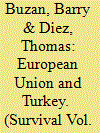

|
|
|
| 15 |
ID:
091561
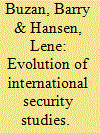

|
|
|
|
|
| Publication |
Cambridge, Cambridge University Press, 2009.
|
| Description |
xiv, 384p.
|
| Standard Number |
9780521694223
|
|
|
|
|
|
|
|
|
|
|
|
Copies: C:1/I:0,R:0,Q:0
Circulation
| Accession# | Call# | Current Location | Status | Policy | Location |
| 054475 | 355.033/BUZ 054475 | Main | On Shelf | General | |
|
|
|
|
| 16 |
ID:
051182
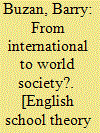

|
|
|
|
|
| Publication |
Cambridge, Cambridge University Press, 2004.
|
| Description |
xviii, 294p.
|
| Series |
Cambridge studies in international relations
|
| Standard Number |
9780521541213
|
|
|
|
|
|
|
|
|
|
|
|
Copies: C:1/I:0,R:0,Q:0
Circulation
| Accession# | Call# | Current Location | Status | Policy | Location |
| 048181 | 303.482/BUZ 048181 | Main | On Shelf | General | |
|
|
|
|
| 17 |
ID:
123630
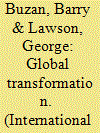

|
|
|
|
|
| Publication |
2013.
|
| Summary/Abstract |
Unlike many other social sciences, international relations (IR) spend relatively little time assessing the impact of the nineteenth century on its principal subject matter. As a result, the discipline fails to understand the ways in which a dramatic reconfiguration of power during the "long nineteenth century" served to recast core features of international order. This article examines the extent of this lacuna and establishes the ways in which processes of industrialization, rational state-building, and ideologies of progress served to destabilize existing forms of order and promote novel institutional formations. The changing character of organized violence is used to illustrate these changes. The article concludes by examining how IR could be rearticulated around a more pronounced engagement with "the global transformation."
|
|
|
|
|
|
|
|
|
|
|
|
|
|
|
|
| 18 |
ID:
145549
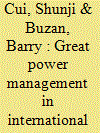

|
|
|
|
|
| Summary/Abstract |
This article is a contribution to the English School’s theory of primary institutions. It offers an historical and structural enquiry into the meaning of great power management (GPM) as a primary institution of international society as it has evolved since the 18th century. We seek to uncover the driving forces that shape this primary institution, and how they are redefining its legitimacy in the 21st century. We are particularly interested in uncovering whether and how particular conditions in international systems/societies facilitate or obstruct the operation of GPM. The article examines how system structures, both material and ideational, have set different conditions for GPM. Using the evolution from traditional to non-traditional security as a template, it sets out the main functions that have evolved for GPM. It shows how the institution has different meanings and roles at different times, and how they play into the legitimacy that GPM requires. It considers how GPM works at both regional and global levels, and concludes by looking ahead at the prospects for GPM, and opening a discussion on how to relate GPM to global governance.
|
|
|
|
|
|
|
|
|
|
|
|
|
|
|
|
| 19 |
ID:
162636
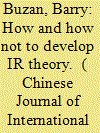

|
|
|
|
|
| Summary/Abstract |
This article starts from the fact that there is a substantial gap in terms of International Relations (IR) theory production between the West and the rest. Its aim is to investigate how that gap might be closed, and for this purpose, the article takes a broad view of what counts as theory. Its method is comparative history: to observe how IR theory has developed not just in the West, which is well-studied, but also in the periphery, which is not. The idea is to identify what material conditions and motivations in both locations were associated with the emergence of theoretical thinking about IR, and how and why theoretical differentiations emerged, particularly within the West. It also looks at conditions and circumstances that seem to work against the successful production of IR theory. The article concludes with a brief consideration of IR theory development in China on the basis of the lessons drawn from the history of IR theory development.
|
|
|
|
|
|
|
|
|
|
|
|
|
|
|
|
| 20 |
ID:
104034
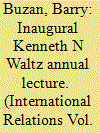

|
|
|
|
|
| Publication |
2011.
|
| Summary/Abstract |
The category of superpower, as distinct from great power, has become naturalized in the discourses about international relations. But 'superpower' has only become common usage since the end of the Second World War and in modern history cannot meaningfully be applied much further than the 19th century. This article argues that superpowers are a historically contingent phenomenon whose emergence rested on the huge inequality of power between the West and the rest of the world that developed during the 19th century. As this inequality diminishes, the most likely scenario for world politics is decentred globalism, in which there will be no superpowers, only great powers. The largest section of the article uses a framework of material and social factors to show why the US is unlikely to remain a superpower, and why China and the EU are unlikely to become superpowers. The following three sections use the same framework to look more briefly at why a world with only great powers is likely to take a more regionalized form; why this might produce a quite workable, decentralized, coexistence international society with some elements of cooperation; and what the possible downsides of a more regionalized international order might be, focusing particularly on the problem of regional hegemony. The conclusions offer five policy prescriptions for living in a decentred globalist world.
|
|
|
|
|
|
|
|
|
|
|
|
|
|
|
|
|
|
|
|
|